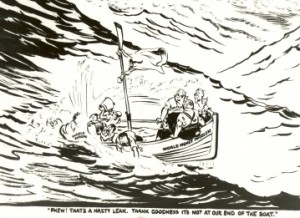FIRST to Andrew Forrest’s $65 million gift to the University of Western Australia, then to Queensland’s bikies law. Forrest has said that he and his family had agreed that they had more than enough to live on in whatever style they wanted, so they should give the surplus to good causes. It means he is sacrificing exactly nothing with this gift. It is easier than giving away unwanted second-hand clothes for him. He does not even have to drive to the Salvos bin. Continue reading “Charity starts and ends with sacrifice, not money”
Category: Uncategorized
In and idler moment when population did not matter
IN 1968 an obscure pop-folk group called The Idlers Five produced a silly, mediocre hit called “Melborn and Sideny”.  Included in the brash, jingoistic ditty were lines so excruciatingly bad that they became seared in my memory: “We’ve got Australian Rules and the Melbourne Cup each year. Sydney’s girls are way out front but we’ve got stronger beer.” Continue reading “In and idler moment when population did not matter”
Included in the brash, jingoistic ditty were lines so excruciatingly bad that they became seared in my memory: “We’ve got Australian Rules and the Melbourne Cup each year. Sydney’s girls are way out front but we’ve got stronger beer.” Continue reading “In and idler moment when population did not matter”
Should public servants be political mutes?
LET’S hope the Case of the Twittering Immigration Employee (Michaela Banerji) has not ended with her dismissal.  The rights of all public servants are at stake here. Continue reading “Should public servants be political mutes?”
The rights of all public servants are at stake here. Continue reading “Should public servants be political mutes?”
Uni reform more than union-bashing
CHRISTOPHER Pyne should grow up. He should leave behind the undergraduate battles of the University of Adelaide in the late 1980s. He has a more serious task of making the best of Australia’s universities. Continue reading “Uni reform more than union-bashing”
For the climate it is a changing
GOUGH Whitlam was asked in his first media conference after taking office in 1972 how could he fulfill his promise to end national service with a hostile Senate likely to stop any repeal of the National Service Act.  The response was swift and imperious: The Minister would simply instruct the department not to conduct any ballots to call up the young men. Continue reading “For the climate it is a changing”
The response was swift and imperious: The Minister would simply instruct the department not to conduct any ballots to call up the young men. Continue reading “For the climate it is a changing”
ACT gay marriage Act set for court challenge
ACT MLA Jeremy Hanson was certainly correct when he predicted this week that the ACT Government’s proposed same-sex marriage laws will end up in the High Court. There are several major constitutional questions. The first questions is: Who has standing to challenge such a law? Then the question arises as to what is marriage as defined in the Constitution? And then whether the Commonwealth’s existing Marriage Act leaves any room for a state or territory to enter the field. Continue reading “ACT gay marriage Act set for court challenge”
More serious that huntin’, shootin’ and fishin’
SOMETHING more serious is going on than a few yobs exploiting a defective Senate voting system. The system’s defects are obvious. As I pointed out in this space in February that “the Freak Senate Preference Show” would elect fringe party candidates with less than 2 per cent of the vote. Told you so. Continue reading “More serious that huntin’, shootin’ and fishin’”
News Ltd becomes Propaganda Unlimited
THEY will be popping the corks at News Ltd newspapers and websites tonight (sept 7). They really have had a superb election. Rupert Murdoch’s man will be over the line and the long hard campaign will have been won.  It began on the first day of the campaign with News Ltd’s mass circulation Sydney tabloid screaming on Page 1 in huge type over a photo of Prime Minister Kevin Rudd announcing the election: “Kick this mob out.” Continue reading “News Ltd becomes Propaganda Unlimited”
It began on the first day of the campaign with News Ltd’s mass circulation Sydney tabloid screaming on Page 1 in huge type over a photo of Prime Minister Kevin Rudd announcing the election: “Kick this mob out.” Continue reading “News Ltd becomes Propaganda Unlimited”
It’s climate change, stupid
(This is my first contribution to Al Jazeera, the Qatar-based independent news service)
CLIMATE change has reared again as a major factor in the Australian political landscape, even as the issue has dropped substantially down the list of important issues for the electorate. Most commentators are saying about this election, “It’s the economy, stupid.” But, over the past seven years, government and opposition positions on what should be done about climate change have had a greater impact on personal and party political fortunes than the economy. Continue reading “It’s climate change, stupid”
Who really saved Australia from the GFC?
KEVIN Rudd is strutting the country this election campaign saying he saved Australia from the global financial crisis. Tony Abbott, on the other hand, says John Howard’s prudence saved Australia, and that Labor squandered more than was necessary to save us. Continue reading “Who really saved Australia from the GFC?”